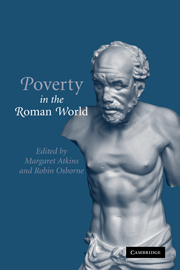Book contents
- Frontmatter
- Contents
- List of contributors
- Preface
- List of abbreviations
- Chapter 1 Introduction: Roman poverty in context
- Chapter 2 The poor in the city of Rome
- Chapter 3 Stratification, deprivation and quality of life
- Chapter 4 ‘You do him no service’: an exploration of pagan almsgiving
- Chapter 5 Writing poverty in Rome
- Chapter 6 Poverty and population in Roman Egypt
- Chapter 7 A pragmatic approach to poverty and riches: Ambrosiaster's quaestio 124
- Chapter 8 Portraying the poor: descriptions of poverty in Christian texts from the late Roman empire
- Chapter 9 Throwing parties for the poor: poverty and splendour in the late antique church
- Chapter 10 Salvian, the ideal Christian community and the fate of the poor in fifth-century Gaul
- Chapter 11 Poverty and Roman law
- Bibliography
- Index
Chapter 11 - Poverty and Roman law
Published online by Cambridge University Press: 22 September 2009
- Frontmatter
- Contents
- List of contributors
- Preface
- List of abbreviations
- Chapter 1 Introduction: Roman poverty in context
- Chapter 2 The poor in the city of Rome
- Chapter 3 Stratification, deprivation and quality of life
- Chapter 4 ‘You do him no service’: an exploration of pagan almsgiving
- Chapter 5 Writing poverty in Rome
- Chapter 6 Poverty and population in Roman Egypt
- Chapter 7 A pragmatic approach to poverty and riches: Ambrosiaster's quaestio 124
- Chapter 8 Portraying the poor: descriptions of poverty in Christian texts from the late Roman empire
- Chapter 9 Throwing parties for the poor: poverty and splendour in the late antique church
- Chapter 10 Salvian, the ideal Christian community and the fate of the poor in fifth-century Gaul
- Chapter 11 Poverty and Roman law
- Bibliography
- Index
Summary
INTRODUCTION
In 454 ad a perplexed praetorian prefect wrote to the emperor Marcian, requesting imperial clarification of a legal ambiguity which was causing great confusion in the law-courts. The prefect sought a definitive imperial ruling which would remove the difficulties that judges and litigants were experiencing in interpreting a law of Constantine excluding ‘low and degraded’ women from being partners in marriage with men of high status. The particular issue was whether ‘the poor’ belonged to this group. Behind this issue, however, lay the deeper problem: how to identify and classify ‘the poor’ as a subset within Roman civil society. Marcian's Novel 4, issued in response to the praetorian prefect's enquiry, purports to provide an answer to the first problem, but circumvents the second, which is the more fundamental. Peter Garnsey has alerted modern historians to the difficulties and complexities surrounding any attempts to formulate an exact taxonomy of the Roman poor or indeed of poverty itself. The emperor Marcian's legislative response to his praetorian prefect offers us some comfort in our modern interpretative difficulties: late Roman legislators, judges and litigants experienced definitional problems at least equal to our own in attempting to classify and categorise their poor.
In fact classical Roman lawyers had been notoriously uninterested in defining a class or category of ‘the poor’, whether according to either juridical or economic criteria. In David Daube's memorable phrase: ‘The have-nots, the vast majority of citizens, were right out of it.’
- Type
- Chapter
- Information
- Poverty in the Roman World , pp. 183 - 203Publisher: Cambridge University PressPrint publication year: 2006
- 7
- Cited by



